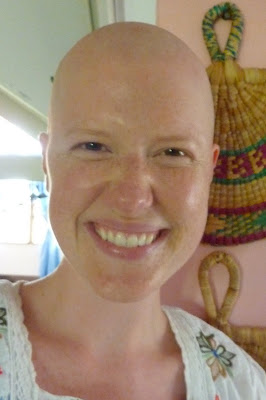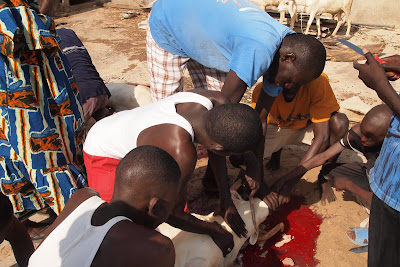Diatock, Casamance and the MMS Multimedia Center
 |
| current progress on the center |
A friend from college who is now a teacher at the Milwaukee
Montessori School (MMS) found out that I was living and studying in Senegal.
She told me that her school had started a project in Senegal three years ago in
one of her colleague’s villages and wondered if I would be interested in doing
some follow-up research on the progress they had made and what work would
remain to be done in the future. I was immediately willing, and we started to
discuss details about the project. As a researcher, one of my favorite aspects
is developing a work plan then seeing it come to fruition as I fill in the
notions I had possessed with facts from what I experienced and observed. There
are always many surprises—generally good and sometimes challenging.
Unfortunately, the Zuiginchor/Dakar ferryboat was under
repair the dates of my trip to Casamance. I was obligated to take the road,
opting to take a night bus on the way there and a 7-seater hatchback on the
return trip. I thought that the 17-hour trip south to Casamance was a hassle
until I compared it with my return trip that included running over a donkey and
waiting six and a half hours to cross a river that measures about 200 yards in
width. Who builds a road without thinking of building a bridge to cross the
river? Africans. Whiling away those hours at the Gambian ferry crossing and
observing buses, semis, political propaganda vehicles, cows and donkeys getting
into and exiting the ferry reminded me of why Africa is considered so
undeveloped. I praise the Lord for his safety and scribble the rest of the
annoyances down in my journal of adventurous experiences.
 |
| with the village chief |
My friend had arranged my accommodations with her
colleague’s family in Diatock—his mother and his brother’s wife, who stayed the
week to help her mother-in-law take care of me. Having come to expect good
hospitality here in Senegal, I was not surprised to find another wonderful host
family during my week in Diatock. Their part of the village did not have any
electricity, so I slept outside most of the nights, praying that the cows and
goats—that wander freely during all hours of the day and night—would not bite
me during my sleep.
 |
| with my host mother and her grandchildren |
My host mother was an extraordinarily kind woman, and her
daughter-in-law and the neighbor girls cooked wonderful food with the few
ingredients they had available. Quite strange is the fact that, in the village,
there are no vegetables. In general, people only cultivate during the rainy
season because few people have access to water all year round. (My host family
had to go to the well every day and fill up big plastic tubs for their daily
water supply.) Few if any have household gardens, so they are dependent upon
what nature gives them. Vegetables were scarce, except onions, but mangos were
as plentiful as the sand on the path I took to and from the school. I ate
mangos for breakfast and for dinner and with each succulent bite, I thanked God
for the abundance he had given me.
My role was to gather information to send to MMS to assist
them in developing a sustainable project that meets the needs of the school and
the community. What I discovered was quite encouraging: one, the community is
very invested in the school (e.g. they have built classrooms for the school out
of collectively pooled funds) and in this project in particular (e.g. all the
professional work is being done by local masons and carpenters and menial tasks
are being done by community members); and two, parents want their children to
have a good education and are willing to make necessary sacrifices to give
active support to ensure their children’s success. I have no doubt that MMS
will have a lasting impression in Diatock, and I am pleased to have been a part
of it, knowing that my report will be instrumental in the completion of the center.
 |
| down by the river with the neighborhood kids |
Tip #19 for Surviving in Senegal: When given a “bathroom”
where the “toilet” is just the cement floor, opt for nature. There is a lot
less splashing and you can pretend that you are camping. I will never
understand this type of bathroom. I would certainly rather have a simple hole
than a cement floor; but maybe the cement holds a special status I am not conferring
on it: a puzzle probably not worth contemplating.





Comments